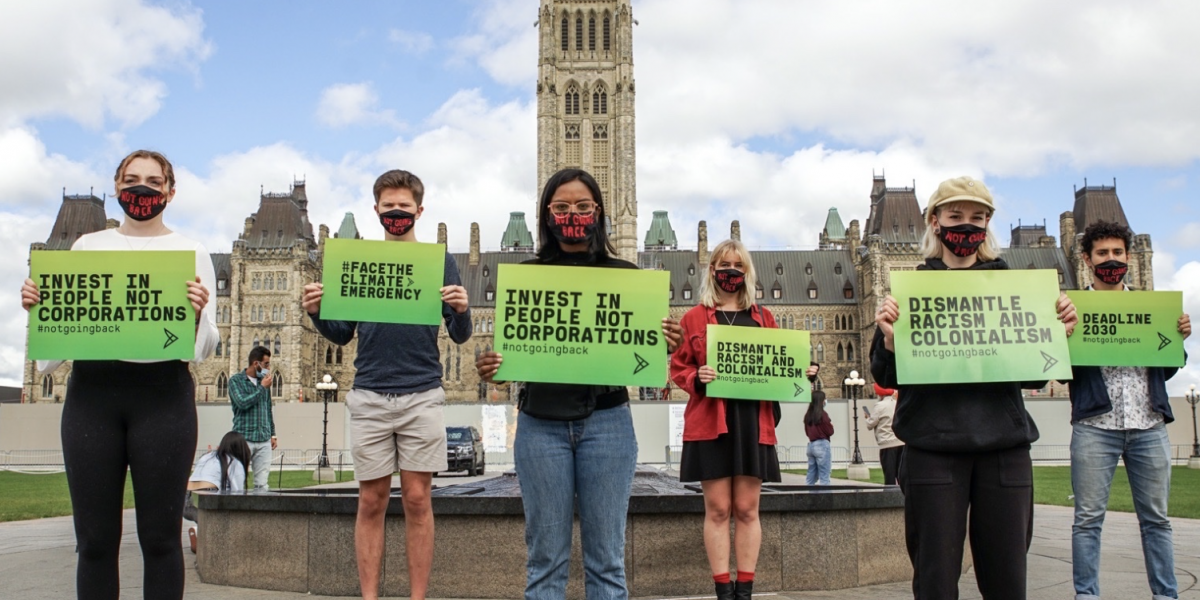The COVID-19 pandemic has impacted health care systems and economies across the globe. It has amplified the existing inequalities, particularly amongst vulnerable and marginalized communities.
The world has suffered what many have called “the worst event of our times”, but “the worst” is yet to come. We are on track to experience unimaginable ecological destruction due to human driven climate change. To counter this and create genuine change, we must fight for a just and green recovery from the COVID-19 pandemic.
Climate crisis still looming
The pandemic limited international travel and reduced commuting due to home-office policies. These measures led to decreased human activity, resulting in a drop in carbon-dioxide emissions; re-emerging wildlife; and caused oil prices to soar. These brief events have had little lasting effect on the climate crisis, reminding us that only systemic shifts will have long-term impacts.
As corporations rush to make up for lost profits, we risk a future with higher pollution, more severe health problems, and greater effects of climate change. Similarly, governments are desperate for the economic boost that comes with the construction of pipelines and rollbacks on environmental protection.
The Government of Canada recently approved the expansion of the Trans Mountain Pipeline in British Columbia. The Trans Mountain Pipeline is a project that would lead to millions of tonnes of extra carbon-dioxide, violating Paris Agreement targets of keeping global temperature under 1.5 to 2 degrees celsius, not to mention how it has drastically affected Indigenous peoples’ land and way of life.
Climate injustice
The pandemic and its long-term effects are not just a reminder of the impact of the systems that perpetuate environmental destruction, but also of our society’s collective vulnerability. Widening income inequalities, racial injustice, the lack of status for migrants in Canada, and disregard for Indigenous rights are all symptoms.
The destruction that climate change will bring will not be experienced evenly. Without a doubt, those who did the least to cause the climate crisis suffer the worst, while multinational corporations take advantage of weak government legislation and state subsidies. If we do not act on climate change now, future generations will experience the worsening effects. It is time for us to demand a safe and sustainable recovery plan based on the principles of climate justice as governments strategize the recovery from the pandemic. The comprehensive set of demands that inform the Just Recovery Movement ensures that economic relief is provided directly to people, that workers and communities find assistance, and build resiliency for crises in the future, especially the climate crisis.
Taking action
While COVID-19 dampens the ability to hold climate strikes and protests, the tentative solution for months was to move events online or even suspend them. However, climate activists around the world have held that in-person public demonstrations are crucial. The climate crisis does not wait: we must work towards mitigating its devastating effects. Fridays for Future Toronto as well as the U of T chapter, unions, student’s associations, and clubs look toward September 25, the next Global Day of Climate Action.
The Fridays for Future (FFF) movement was started by 15-year old Greta Thunberg in 2018, and has since spread around the globe. Toronto is no exception. FFF Toronto is committed to sending a message to policymakers and businesses demanding a safer and sustainable future.
U of T students from a variety of programs including music, engineering, urban studies, psychology, and many others have worked to build FFF U of T. The organization serves the purpose of networking amongst student unions and clubs to increase student engagement in climate activism and raise awareness about the importance of indigenous sovereignty; defending land, water and life; and youth empowerment.
The action on September 25 will be a mass sit-in to demand a Just, Green Recovery from COVID-19. The sit-in will be officially starting at noon. A variety of precautions to prevent the spread of COVID-19 will be taken, including mandatory mask wearing, sanitization stations, and physical distancing.
FFF U of T is committed to a community driven response to climate change following the principles of climate justice, and we welcome and call on all U of T students to join us in this movement for a better future for everyone.
For more information, visit https://www.fridaysforfutureto.org/fffuoft or @fridaysforfutureuoft on Instagram. Find September 25 Global Climate Action event near you at: https://fridaysforfuture.ca/event-map/
Did you like this article? Help us produce more like it by donating $1, $2, or $5. Donate

